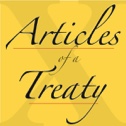Click the logo to go to the Articles of a Treaty
homepage
We will go anywhere on this land which belongs to us camping sometimes in one place and sometimes in another. We do not want to dispose of our land. ‒TWO LANCE, FORT SULLY, AUGUST 31, 1867
There is a big railroad running through here; that is hard for us, but that is all right. I hope there will be no more roads running through our country. ‒MAN THAT TALKS SECRET, FORT LARAMIE, APRIL 18, 1868
We want to live on the wild game as long as it lasts. This country across the river belongs to us. We want the privilege of going over the country as long as the game lasts. ‒SPOTTED TAIL, NORTH PLATTE, SEPTEMBER 20 1867
The buffalo genocide cut off food for Lakotas. It also reduced treaty territory set aside as hunting territory. No buffalo. No hunting. Thus the territory could be taken. ‒NICK ESTES, LOWER BRULE SIOUX TRIBE, 2019
I wanted to capture [in my painting] the very first moment the train arrived here. As you can see: all the warriors are running along, looking towards the train. ‒EVANS FLAMMOND, SR., ROSEBUD SIOUX TRIBE, 2019
My great great grandfather, Chief Red Cloud, was the last Oglala to sign the 1868 Fort Laramie Treaty ... I believe that if our ancestors had not signed this treaty, then our right to live in an area of our traditional territory would not exist. ‒DORENE RED CLOUD, OGLALA SIOUX TRIBE, 2019
The Treaty is personal to my family because my great, great, great grandfather was a headman ... when warriors went out to inform him that he should go to Fort Laramie for the Treaty signing and there would be presents and gifts given to him. He did not go into the fort and did not sign the Treaty. ‒BRANDON SPRAGUE, CHEYENNE RIVER SIOUX TRIBE, 2019
Article 11. HUNTING TERRITORY and GOVT EASEMENTS
Citizens have the right to hunt in the territory as long as there are enough buffalos to justify the chase. The tribe will not oppose railroads, wagon roads, mail stations, or other works of utility or necessity. The US is to pay for works of utility or necessity based on an assessment of a three-member commission, one being a chief or headman of the tribe.
ARTICLE 11. In consideration of the advantages and benefits conferred by this treaty, and the many pledges of friendship by the United States, the tribes who are parties to this agreement hereby stipulate that they will relinquish all right to occupy permanently the territory outside their reservation as herein defined, but yet reserve the right to hunt on any lands north of North Platte, and on the Republican Fork of the Smoky Hill River, so long as the buffalo may range thereon in such numbers as to justify the chase. And they, the said Indians, further expressly agree:
1st. That they will withdraw all opposition to the construction of the railroads now being built on the plains.
2d. That they will permit the peaceful construction of any railroad not passing over their reservation as herein defined.
3d. That they will not attack any persons at home, or travelling, nor molest or disturb any wagon-trains, coaches, mules, or cattle belonging to the people of the United States, or to persons friendly therewith.
4th. They will never capture, or carry off from the settlements, white women or children.
5th. They will never kill or scalp white men, nor attempt to do them harm.
6th. They withdraw all pretence of opposition to the construction of the railroad now being built along the Platte River and westward to the Pacific Ocean, and they will not in future object to the construction of railroads, wagon-roads, mail-stations, or other works of utility or necessity, which may be ordered or permitted by the laws of the United States. But should such roads or other works be constructed on the lands of their reservation, the Government will pay the tribe whatever amount of damage may be assessed by three disinterested commissioners to be appointed by the President for that purpose, one of said commissioners to be a chief or head-man of the tribe.
7th. They agree to withdraw all opposition to the military posts or roads now established south of the North Platte River, or that may be established, not in violation of treaties heretofore made or hereafter to be made with any of the Indian tribes.
Curriculum
